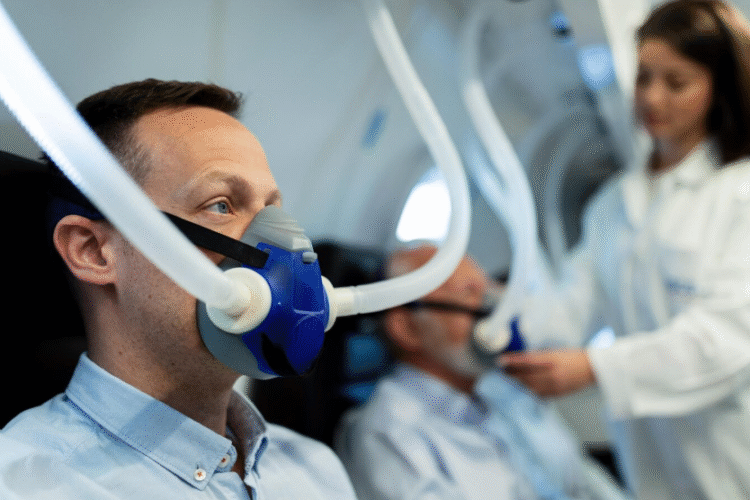Meta Description: Discover how CPAP therapy for sleep apnea improves workplace performance, health, and productivity. Learn the benefits, science, and tips for successful treatment.
Introduction
Sleep apnea is a common yet serious sleep disorder affecting millions of workers worldwide. Left untreated, it can lead to chronic fatigue, decreased productivity, and even long-term health risks. Fortunately, CPAP therapy for sleep apnea offers an effective solution, helping individuals breathe easier at night and stay alert during the day.
In this article, we’ll explore how CPAP works, its benefits, and practical tips for managing sleep apnea in the workplace.

What Is Sleep Apnea?
Sleep apnea is a condition where breathing repeatedly stops and starts during sleep. The most common type, obstructive sleep apnea (OSA), occurs when throat muscles relax, blocking the airway. Symptoms include:
- Loud snoring
- Gasping for air during sleep
- Morning headaches
- Daytime fatigue
- Difficulty concentrating
For employees, untreated sleep apnea can lead to:
✔ Poor job performance
✔ Increased risk of workplace accidents
✔ Higher absenteeism
Recognizing these signs is the first step toward effective treatment.

How Does CPAP Therapy Help?
CPAP (Continuous Positive Airway Pressure) therapy is the gold standard for treating moderate to severe sleep apnea. A CPAP machine delivers a steady stream of air through a mask, keeping the airway open. Here’s how it works:
- Airflow Delivery – The machine pushes pressurized air into the throat, preventing collapse.
- Customizable Pressure – Settings are adjusted based on individual needs.
- Improved Oxygen Levels – Reduces pauses in breathing, ensuring restful sleep.
By maintaining an open airway, CPAP therapy helps users wake up refreshed and more productive.
The Science Behind CPAP Machines
CPAP devices consist of three main components:
- Motor – Generates the airflow.
- Mask – Covers the nose/mouth to deliver air.
- Hose – Connects the mask to the machine.
Modern CPAP machines also feature:
✅ Humidifiers – Prevent dryness and irritation.
✅ Ramp Settings – Gradually increase pressure for comfort.
✅ Data Tracking – Monitors sleep patterns for better adjustments.
Studies show that consistent CPAP use significantly improves sleep quality and reduces health risks like hypertension and heart disease.

Benefits of Using a CPAP Machine
Employees with sleep apnea who use CPAP therapy experience:
✔ Increased Energy – No more daytime drowsiness.
✔ Better Focus – Improved cognitive function.
✔ Enhanced Mood – Reduced irritability and depression.
✔ Lower Health Risks – Decreased chances of stroke and diabetes.
For employers, supporting CPAP use can lead to:
- Higher productivity
- Fewer workplace errors
- Reduced healthcare costs

Common Challenges & How to Overcome Them
While CPAP therapy is highly effective, some users face initial hurdles:
| Challenge | Solution |
|---|---|
| Mask Discomfort | Try different styles (nasal pillows, full-face masks). |
| Dry Mouth/Nose | Use a heated humidifier. |
| Difficulty Adjusting | Start with lower pressure and gradually increase. |
| Noise Concerns | Choose a quiet, modern CPAP machine. |
Consistency is key—most users adapt within a few weeks.
Tips for Successful CPAP Therapy
To maximize the benefits of CPAP therapy for sleep apnea, follow these tips:
- Stick to a Routine – Use the machine every night, even for naps.
- Keep Equipment Clean – Prevent infections by washing masks and hoses regularly.
- Adjust for Comfort – Experiment with mask fit and humidity settings.
- Travel-Friendly Options – Portable CPAP machines make business trips easier.

Frequently Asked Questions (FAQ)
1. How long does it take to see results from CPAP therapy?
Most users feel more energetic within days, but full benefits may take a few weeks.
2. Can I use CPAP if I only have mild sleep apnea?
Yes—early treatment can prevent worsening symptoms.
3. Will CPAP therapy cure my sleep apnea?
It doesn’t cure it, but it effectively manages symptoms when used consistently.
4. Is CPAP covered by insurance?
Most health plans cover CPAP machines with a doctor’s prescription.
Final Thoughts
Sleep apnea shouldn’t hinder your work performance or health. CPAP therapy offers a proven solution, helping you sleep better and stay sharp during the day. If you suspect sleep apnea, consult a sleep specialist for a proper diagnosis and treatment plan.
Take the first step today—better sleep leads to a better work life!
Sources:




0 Comments